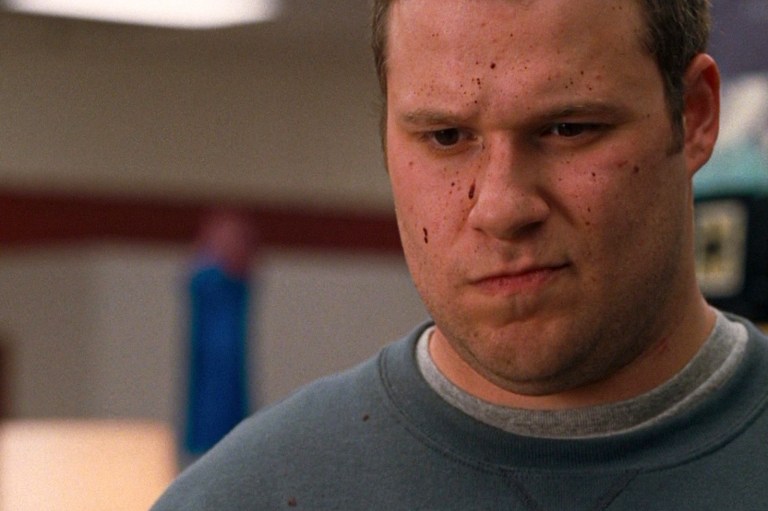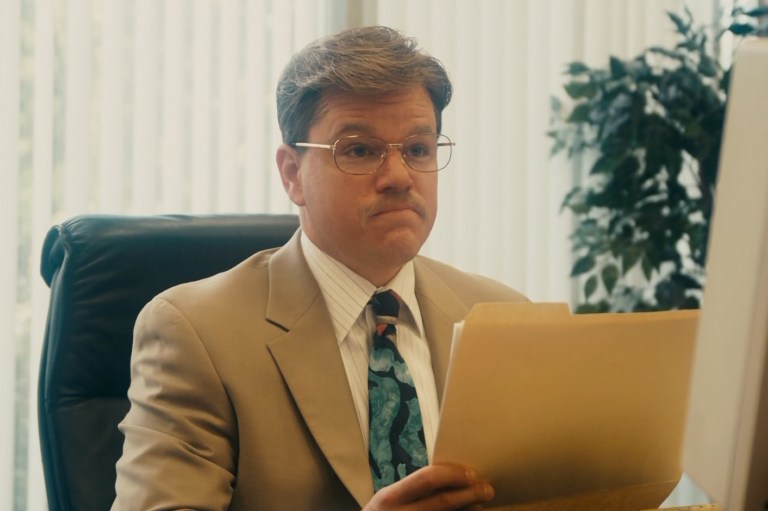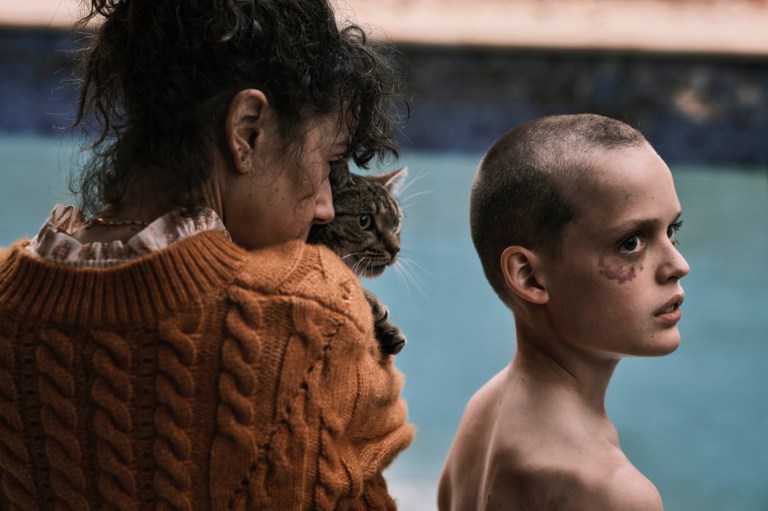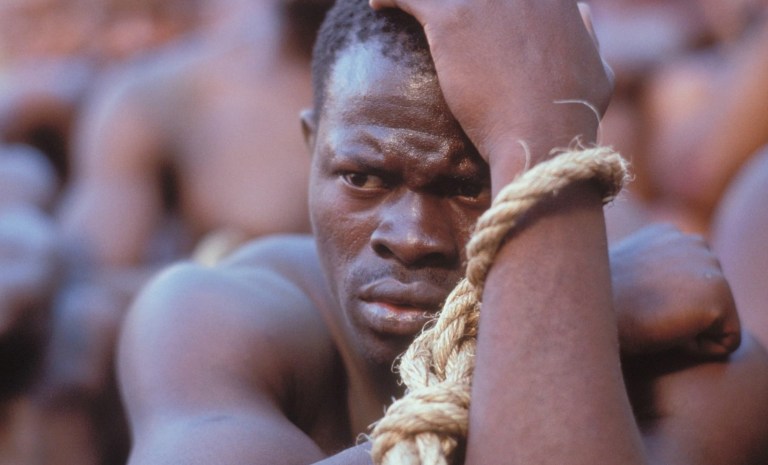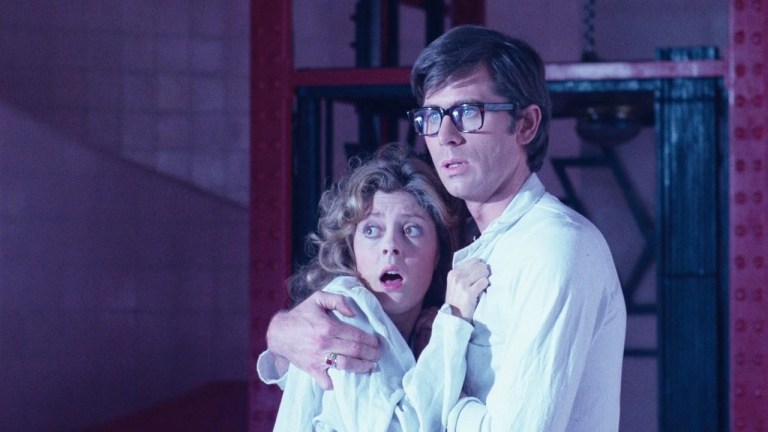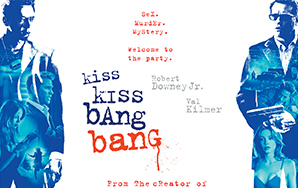
The Most Underrated Movies Of The Last 10 Years
Kiss Kiss Bang Bang (2005)
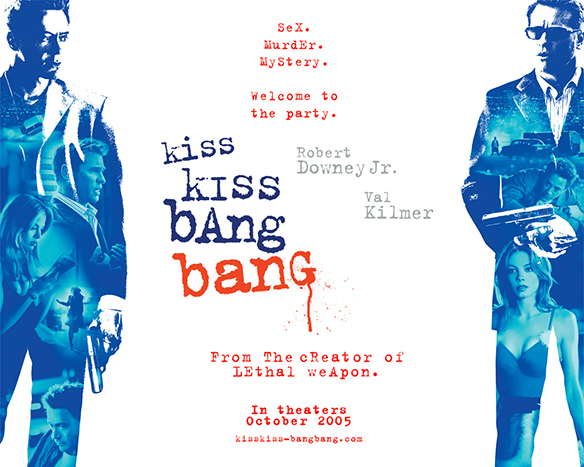

10 Words or Fewer Summary: Criminal faking as an actor gets embroiled in murder case.
A consistently creative and wildly fun effort from action/comedy old-hand Shane Black (writer, Lethal Weapon), Kiss Kiss Bang Bang arrived like a breath of fresh air, radiating wit and charm. Carried by a terrific, self-effacing irreverence imbued by Black, as well as dynamite performances from Robert Downey, Jr. and Val Kilmer, Kiss Kiss is a modern noir that rarely takes itself too seriously and is all the better for it. Though Downey and Kilmer have crackling chemistry, Michelle Monaghan also delivers a performance of note as the leading lady. The film, though not widely seen, garnered strong reviews and helped rejuvenate both Downey and Black’s careers — it’s no coincidence that the duo teamed up recently for the mega-blockbuster/printing press Iron Man 3. But seriously, Val Kilmer plays a sassy, gay private investigator named Perry van Shrike! His nickname is “Gay Perry”! What the hell more do you want?
Perhaps this professional film critic can convince you: “It’s a noir deconstruction, so of course things get overly complicated, and soon we have look-a-likes and incest and fishy suicides and strange connections from the past and a corpse in a shower that Downey accidentally urinates on… Black has sat in the director chair and begun his new career by reminding us that a fun movie can also be smart. That you can go to the movies, have a complete fucking blast, and not feel like you were being condescended to for two hours.” (Devin Faraci, Chud)
Chasing Ghosts: Beyond the Arcade (2007)
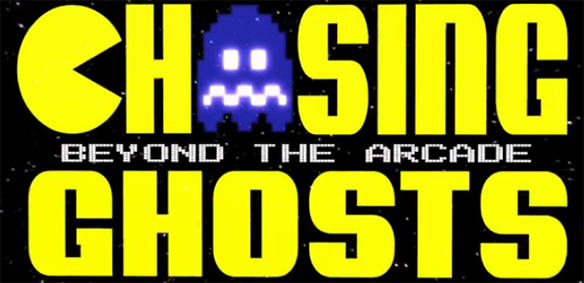

10 Words or Fewer Summary: Gamer nerds relive their brief taste of fame/success.
An unheralded film about champion 80s arcade gamers that I serendipitously found on Hulu (it’s still there for free streaming) turned out to be one of my favorite documentaries of the decade. Chasing Ghosts doesn’t have the draw of a polarizing (or important) topic like Bowling for Columbine or An Inconvenient Truth, but what it lacks in flash and headline-stealing relevance, it makes up for in quirky idiosyncrasy. The players profiled in the film, hardcore gamers and unabashed nerds who enjoyed (and were forever marked by) a fleeting glimpse of mainstream recognition and popularity, are so compellingly odd that you find yourself drawn inexorably into their world as they relive decades-old glories, failures, and feuds: There are cheating scandals! And implications of gamer groupies! You’ll even meet Mister Awesome, the self-created, macho superhero who stars in his own soft-core porn and claims that Arnold Schwarzenegger, America’s “most successful immigrant,” built his fortune as a drug dealer and a prostitute. Chasing Ghosts masterfully explores the niche of their subculture, creating a rich ethnography on this self-sustaining community of virtuoso, albeit sheltered, performers. The movie is understated and sweet – while perhaps not as dramatic as most other quality docs, it’s an unusual and enjoyable film, and it does justice to these distinctly strange men without mocking them.
Perhaps this professional film critic can convince you: “Visually arresting look at the dynamics of competition and camaraderie that animated a fascinating geek subculture will entertain just about anyone who’s ever tried their hand at Pac-Man, while paying affectionate tribute to a bygone era.” (Justin Chang, Variety)
Hot Rod (2007)
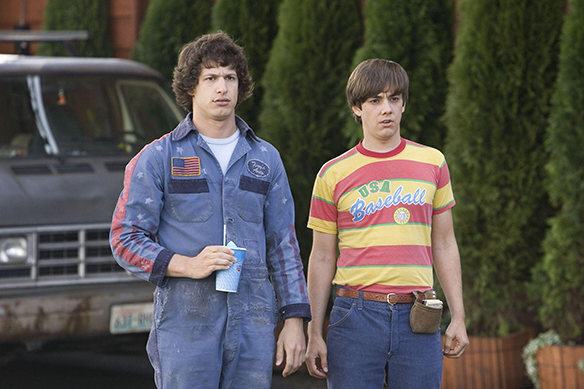

10 Words or Fewer Summary: Wannabe stuntman raises money to beat up dying stepfather.
Everyone has a dumb comedy they inexplicably love, but I feel like my obsession with Andy Samberg’s Hot Rod is, well…explicable. Hot Rod is an absurdist (read: silly) comedy and it may take a few viewings to register — I thought it was hysterical the first time I saw it, but my friends sat in silence or merely chuckled at the excessive awkwardness of Samberg and his crew of pathetic friends. But those same people that didn’t know what to make of the film still found themselves curiously drawn to it, and inevitably wound up watching it a second time and falling for its odd charm. Most of these folks now consider it one of their favorite recent comedies, but based on the film’s lukewarm reception and relative obscurity, I think that might be more indicative of my group of friends than society as a whole (my college roommates and I became obsessed with even the most insignificant of the film’s many in-jokes, including seeking out and watching an extremely not-good 80s comedy called The Whoopee Boys that Hot Rod casually references). But to me, the film is a wonderful hybrid of kinetic slapstick and SNL-style asides. It also features early performances from scene-stealers Danny McBride and Bill Hader. My favorite scene? It changes every time I watch it, but today I’ll go with a distraught Will Arnett screaming, “BABE! BABE WAIT! BABE NOOOOOO! BABE!” for an inordinately long amount of time while his girlfriend runs down the street and out of their relationship.
Perhaps this professional film critic can convince you: “And yet beyond the ‘Jackass’-style violence and popular culture one-upmanship, there’s something that seems almost important about this picture. The creators have harnessed everything that’s good about YouTube, and translated it into a big-screen movie.” (Peter Hautlaub, San Francisco Chronicle)
The Informant! (2009)
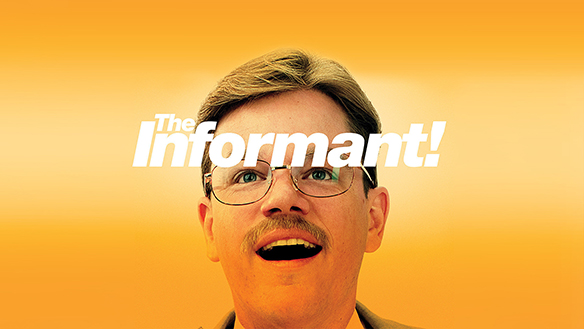

10 Words or Fewer Summary: Corporate exec. gets mixed up in FBI whistle-blowing scandal.
Lots of people didn’t like Steven Soderbergh’s The Informant! “Is it a slight drama or a black comedy?” they wondered. “And why is the main character such an idiot? Or is he actually some kind of warped genius? Are we supposed to like him? And what’s with the campy, 60s kitsch soundtrack?” I understand those complaints, but I have an incredible admiration for Soderbergh’s elusive film, which alters its tone more abruptly than a Formula One racer changing gears. The Informant! is as delightfully unpredictable as main character Mark Whitacre (spectacularly played by Matt Damon), an enigmatic cipher who sometimes seems like a guileless moron and others a manipulative, compulsive liar. Despite the seemingly ironic stance employed by Soderbergh and Damon (i.e., the title’s exclamation point), both find a genuine pathos in the character, with results that are unexpectedly stirring. I also enjoyed Soderbergh’s choice to cast comedians and comedic actors (Joel McHale, Patton Oswalt, Paul F. Tompkins, Tom Papa, Tony Hale) in no frills, straight-man roles.
Perhaps this professional film critic can convince you: “For all the silly walks and comic cameos, anger fuels ‘The Informant!,’ giving it its pulse and reason for being. Anger inspires its giggles, forces its tears and might even explain the fiery orange that colors so many faces, as if this world and its people were on the verge of immolation. Like all of Mr. Soderbergh’s movies, this one can be appreciated on purely formal terms, for the clarity of its images and the economy of the storytelling. But it is Mr. Soderbergh’s insistence on seeing the A.D.M. scandal as a collective tragedy rather than as another white-collar crime that gives the movie force, resonance, feeling. In the face of such corruption perhaps only laughter will do: after all, for a while now the joke has most definitely been on us.” (Manohla Dargis, New York Times)
Moon (2009)
![Moon [2009] (2009) Sam Rockwell; Kevin Spacey; Dominique McElligott](http://thoughtcatalog.com/wp-content/uploads/2013/05/ldjlfkjsdf.png)

10 Words or Fewer Summary: Increasingly odd occurrences beset a lonely moon-harvester.
One of the best science-fiction films of the 2000s, Moon is a tense, mesmerizing portrait of isolation, paranoia, and sanity/the lack thereof. Featuring (duh) an incredible performance from Sam Rockwell, Moon evokes the psychotic, techie tones of a Philip K. Dick novel (the fact that the main character is a hybrid maintenance man/moon farmer is a direct nod to Dick’s work), recreating the author’s vision more fully than any of the films actually based on his work, except for maybe A Scanner Darkly. It also plays sort of like a small-scale, intensely personal 2001 — even featuring a HAL-inspired AI program named GERTY, voiced by a particularly wry Kevin Spacey. Interestingly enough, Moon was directed by Duncan Jones, aka the freaking son of David Bowie. Jones went on to direct the better-known, but less effective Source Code.
Perhaps this professional film critic can convince you: “As it turns out, the moon is just another shitty place to work, and as the hero discovers to his horror, even his own selfhood is company property.” – (J.R. Jones, Chicago Reader)
Observe and Report (2009)
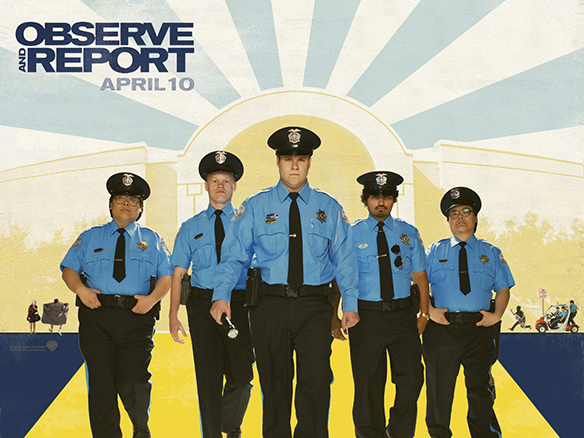

10 Words or Fewer Summary: Delusional mall security guard takes job way too seriously.
One of the most eccentric and disturbing comedies to get a major release in the past decade, Observe and Report is alternately deplorable and hilarious, off-putting and provoking. With the precision of a heartless sniper aiming at helpless prey, writer-director Jody Hill switches targets with ease; the joke goes from being on the main character, to those around him, to the audience, with everything culminating in one of the most bizarre and grotesque endings ever filmed. The cast is effectively despicable, the subject matter (power, violence, addiction, insanity) sufficiently unpleasant, and the overall result delightfully black. Although short, the film plays slow at times, and occasionally misses the mark, but the shortcomings don’t overshadow a refreshing refusal to follow convention or pander to broader audience tastes. Makes for a perverse double-feature with Paul Blart: Mall Cop.
Perhaps this professional film critic can convince you: “Given that the ordinarily likable Seth Rogen is portraying a delusional, violent, sexist, racist, homophobic mall cop with a bipolar disorder, there’s not really a lot to laugh at.” (John Anderson, Washington Post)
Wait, I don’t think he liked it. Let’s try this one: “‘Observe and Report,’ which opens today and stars Seth Rogen, has been pre-mocked as ‘Paul Blart 2.’ But this new movie is crazier, scarier, funnier, and more bewildering. It’s the strangest movie I expect to see from a Hollywood studio for the rest of the year.” (Wesley Morris, Boston Globe)
Meek’s Cutoff (2010)
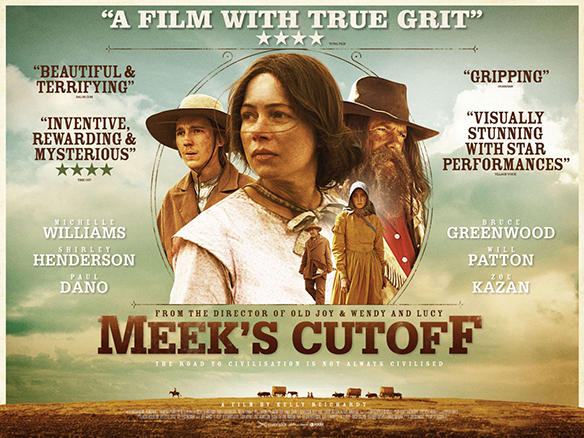

10 Words or Fewer Summary: Pioneers panic after realizing their guide is completely lost.
The minimalist, harrowing drama Meek’s Cutoff is probably best known for igniting a debate about art and entertainment when NY Times Magazine’s Dan Kois labeled it as boring and cited watching it as an example of “eating your cultural vegetables” (i.e., something that you do out of a need to prove your sophistication, rather than for pleasure). While the debate had merit, using Meek’s Cutoff as a central example of an overcooked cultural vegetable was misguided — chiefly because, well, the film isn’t boring. It’s slow-moving and sparse, but it’s also fucking terrifying and intense and taut and forces you to consider the pioneer experience in ways that you never really wanted to. Meek’s Cutoff is kind of like the classic computer game Oregon Trail, except crossed with The Shining — instead of laughing when your pioneer family gets lost and the wagon breaks a wheel, the movie makes you realize the utter horror of wandering hopelessly across barren terrain with some other family that you’re starting to view less as companions and more as potential brunch.
Perhaps this professional film critic can convince you: “Beyond that, ‘Meek’s Cutoff’ is a film that works masterfully with space, time and history. You could call it a thriller or horror movie in extreme slow motion, or a parable that’s more about 2010 than 1845. At various moments it recalls Bertolucci’s ‘The Sheltering Sky,’ Erich von Stroheim’s ‘Greed’ and those verses from the Old Testament. No doubt it would bore many people silly, but its mood of desolation, danger and desperate faith affected me more powerfully than anything else I saw amid the onslaught of cinema at Toronto this year.” (Andrew O’Hehir, Salon)
Margin Call (2011)
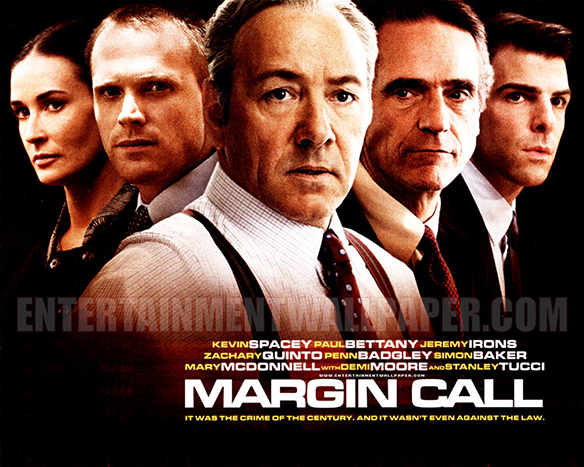

10 Words or Fewer Summary: 36 frenzied hours at Wall Street investment bank facing crisis.
Though critics gave more attention to the admittedly terrific documentary Inside Job, no film better illuminated and dramatized the financial crisis of 2008 than Margin Call. First-time director J.C. Chandor’s incredibly assured film kept me wildly riveted, as he insightfully (yet objectively) depicted the ethical dilemmas that many financial heads faced as dire cracks in the foundation of our nation’s economy began splintering beyond repair; thanks to our knowledge of the resulting economic catastrophe, the film is seeped with enough panic and dread to outdo 10 big-budget, 2012-style disaster flicks. The writing (also by Chandor) is crisp and engrossing and there are savory performances from both relative unknowns and established stars (Paul Bettany, Kevin Spacey, Stanley Tucci, Jeremy Irons, Demi Moore). Margin Call reminds me of The Wire in that it resists the temptation to make villains out of easy targets (in Margin Call, bankers, in The Wire, drug dealers and politicians and mobsters, et al), instead focusing on how the invisible strings of society make puppets of us all.
Perhaps this professional film critic can convince you: “’Margin Call’ is one of the strongest American films of the year and easily the best Wall Street movie ever made… In this largely indoor movie, the city looming outside is a palpable presence; the camera, quiet and relentless in moments of confrontation, tracks silently at night through the empty trading floor, a ghost invading a once healthy company.” (David Denby, The New Yorker)
Martha Marcy May Marlene (2011)
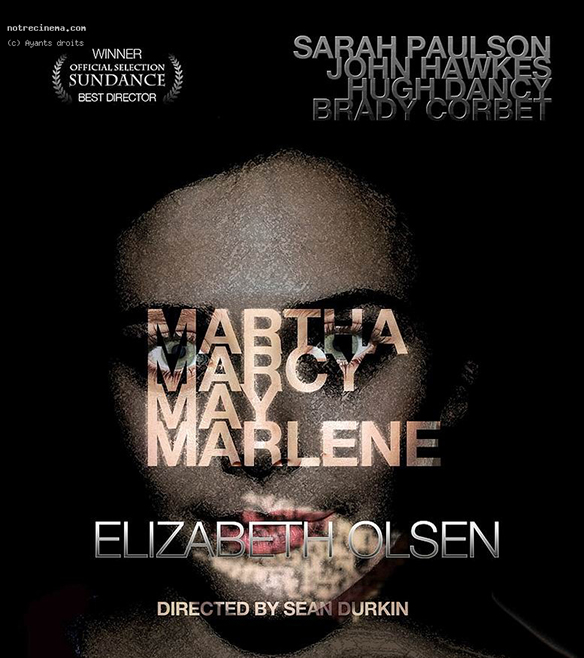

10 Words or Fewer Summary: Woman suffers PTSD from time spent with mysterious cult.
I’ve written about this one before, citing it as a prime example of a movie outside the horror genre that is completely horrifying. The first feature from writer-director Sean Durkin, Martha Marcy May Marlene is essentially a 90-minute long panic attack — a foreboding, ominous, atmospheric vision of a former cult member’s PTSD over her time with a dangerous, Mansoneqsue clan. Durkin switches unsettlingly between recollections of Martha’s disturbing past with her seemingly innocuous present-day recovery at her sister and brother-in-law’s picturesque lake house. However, the fear and anxiety from Martha’s previous life inevitably reemerge during her rehabilitation — and, like Martha, the audience becomes vulnerable to the panicky sensation that evil lurks around every mundane corner. Akin to walking on egg shells in Timberlands, Martha Marcy May Marlene is frightfully tense, and even features an excellent performance from Elizabeth Olsen, sister to the Olsen twins! Seriously, what were the odds on the Olsen twins having a talented third sister? Suck on that, Brontë family.
Perhaps this professional film critic can convince you: “‘Martha Marcy May Marlene’ is an utterly gripping ride that will keep you guessing until the last second about what is real and what imagined, and whether Martha has entirely snapped the tether of sanity.” (Andrew O’Hehir, Salon)
Young Adult (2011)
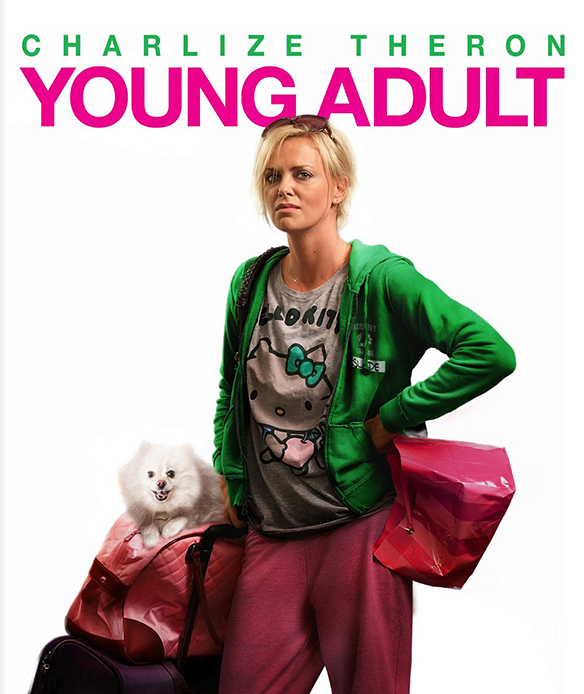

10 Words or Less Summary: Troubled thirty-something tries to steal back engaged ex.
I can respect any film that looks uncompromisingly at a distinctly unpleasant person and finds pathos and compassion without resorting to feel-good clichés or typical, redemptive Hollywood story arcs. With their desperation to please, comedies tend to present characters as we wish to see ourselves — engaging in witty banter, falling in love, and effectively using laughter as a weapon to undercut palpable undercurrents of depression and anxiety. Young Adult, jet-black and jagged, does none of the above; as far as Hollywood entertainment comes, it goes down about as well as one of Mavis’ (played by a fearless Charlize Theron) bourbon shots. The film is about a cruel, shallow person living an unhappy, empty life; as it progresses, the glimpses of severe depression, addiction, and even schizophrenia become unmistakable signs of a stagnant person in a state of emotional decay. While others might (and did – it was not a particularly popular film) detest Theron’s Mavis to the point that they are unable to find any connection to the film, I was riveted if only because what I found most contemptible about Mavis was that she so openly flaunted the faults I fear I hide with myself. It’s not much of a comedy, but it’s a hell of a character study.
Perhaps this professional film critic can convince you: “Every time you’re ready to write off Hollywood comedies, along comes a picture like ‘Young Adult’ to keep hope alive.” (Rene Rodriguez, Miami Herald) ![]()
